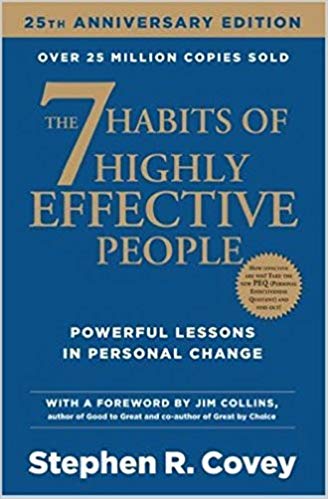

This article is an excerpt from the Shortform summary of "The 7 Habits of Highly Effective People" by Stephen Covey. Shortform has the world's best summaries of books you should be reading.
Like this article? Sign up for a free trial here .
What are paradigms and principles, and what do they mean for your life? How can the 7 Habits help you establish your paradigms and principles, and help you make change based on them?
We know that the 7 Habits promotes an inside-out approach. Once you identify your paradigms and principles, you can work on the inside-out approach to create positive and effective change.
What Is the Inside Out-Approach?
The 7 Habits of Highly Effective People endorses an inside-out approach to improving yourself and your life. This method starts with examining and adjusting your character, your motives, and how you see the world; only when you start from the foundation of your character and your worldview can you make lasting behavioral changes.
This inside-out approach entails
- Making improvements to your character before your personality
- Focusing on principles before practices
- Adjusting your paradigms, or how you see the world, in order to change your actions
- Improving yourself (achieving so-called “private victories”) before you can build better relationships with others (“public victories”)
Keep reading to understand how paradigms and principles can help you execute an inside-out approach.
Center Your Paradigm in Principles
Despite how your personal paradigms and principles cause you to interpret the world, there are indisputable principles that are part of reality — including fairness, integrity, honesty, human dignity, potential, growth, and patience. Put simply, your paradigms determine your values and behavior, which you can control, but principles determine the consequences of your behavior, which are beyond your control.
Principles are universally recognized, across cultures and languages and generations. You can tell that a principle is fundamental and self-evident because the prospect of following its opposite (e.g. living dishonestly or without dignity) seems ridiculous.
Sometimes we run up against these unalterable principles, and that forces your paradigm to shift. To illustrate this, consider the story of a battleship that was passing through patchy fog as night fell. A crew member was looking out for ships and other objects when he saw a light approaching. He alerted the captain, who told the crew member to signal that the source of the light, presumably another ship, change course to avoid collision. A signal came back advising the battleship to change course; again, the captain insisted the other side change course. This went back and forth as the captain got increasingly frustrated, until the battleship received a signal that the source of the light was a lighthouse. Chagrined, the battleship crew had to change its course.
Principles are different from practices; a principle is a fundamental truth while a practice is an action that is applicable to specific situations. However, principles can dictate deeply held habits — like a habit of being fair, honest, or patient — and those habits can determine the practices you use to approach different situations. The more your paradigms, habits, and practices align with principles, the more smoothly and effectively you can move through life.
Paradigm Shifts Can Change Your World—and Your Principles
Changing your paradigm and principles brings powerful, dramatic change because it introduces a whole new way of thinking. This inevitably leads to a change in attitudes, behaviors, and relationships.
Thomas Kuhn introduced the term “paradigm shift” to describe major scientific breakthroughs in his book, The Structure of Scientific Revolutions. In all areas of life, paradigm shifts have shaped history.
- Copernicus’s claim that the planets revolved around the sun was a paradigm shift from the belief that the earth was the center of the universe.
- Before scientists developed the germ theory, large numbers of women and babies were dying during childbirth and more soldiers died from infections in minor wounds than major battlefield traumas. But the concept that germs existed — a paradigm shift — led to drastic improvements in medical outcomes.
- The creation of democracy was a paradigm shift from the long-held tradition of monarchies. This radical change created an entirely different way of forming and regulating government.
A paradigm shift doesn’t always change things for the better; for example, the progression from Character Ethic to Personality Ethic was a paradigm shift that moved to emphasize quick fixes over foundational improvements.
Paradigms can change quickly — through life-altering experiences — or gradually.
Identifying Your Center Through Principles
Creating your personal mission statement requires a process of deep reflection and self-evaluation as you examine your paradigms and principles and discover the values that guide your decisions and actions.
Your core paradigms reveal your center; you can be centered on your marriage, friendships, family, work, money, possessions, pleasure, or, ideally, principles. Whatever is at your center determines your security, guidance, wisdom, and power.
Here’s a discussion of the most common centers, along with the problems they cause:
- If you’re marriage-centered, your sense of identity and self-worth is determined by the health of your relationship at that moment.
- If you’re family-centered, you derive your security from the strength of your family traditions and reputation.
- Surprisingly, being friend- or enemy-centered is largely the same; in both contexts, your interactions with other people, their opinions of you, and their treatment of you determine your sense of self-worth.
- If you’re money-centered, your self-worth changes with the rise and fall of your net worth.
- If you’re work-centered, you base your identity in your profession and your position at work; work-centered people are likely to be “workaholics” who sacrifice their relationships, health, and hobbies in the name of work.
- If you’re possession-centered, your focus and self-worth are tied up in material possessions (e.g. cars, homes, and nice clothes) or intangible possessions (e.g. social status, authority, and recognition).
- If you’re pleasure-centered, your main priority is on having fun and maximizing your pleasure in life, to the neglect of work, relationships, and self-discipline.
- Being church-centered is distinct from being spiritually or religiously centered. Whereas being spiritually centered can guide you through inner examination and discovery, being church-centered emphasizes the appearance of being involved in the community, meeting social standards, and clearly displaying your membership in the group.
- If you’re self-centered, you’re driven more by selfishness than by an earnest attempt to develop and improve yourself.
Many people have multiple centers; sometimes one takes precedence until it is momentarily satisfied (e.g. if you’re marriage-centered, your relationship with your spouse is in a happy place), and then another focus rises as the primary center for a period of time. For a consistent, reliable source of security, guidance, wisdom, and power, it’s best to have one center; this creates a clear focus of your values and priorities.
All of the centers above seem to have issues. So what’s the ideal center to have? Covey argues it’s a center based around your principles.
How do they Work Together? Developing Paradigms and Principles Through the 7 Habits
Throughout the 7 Habits, you’ll work on shifting your paradigm and understanding your principles to encourage self-improvement. These are some examples of how the 7 Habits will help you understand your paradigms and principles.
Habit 2: Principles in Your Mission Statement
When you sit down to create a personal mission statement, start by looking at the most basic paradigms that dictate how you see the world. As you examine these paradigms, they’ll reveal your innermost values and principles.
Each person’s mission statement will be distinct because everyone is unique and has individual experiences; rather than inventing your mission or emulating someone else’s, try to find your mission through self-examination, reflection, and honest assessment of your unique strengths and values.
The process of writing your mission statement requires deep introspection and careful thought. Allow ample time for this — it may take weeks or months to take an honest and thorough look at your paradigms and driving forces. The process itself is just as important as the final result, because it makes you think through how you want to live your life and what actions reinforce that.
Habit 3: Principles and Paradigms in Time Management
In the 7 Habits, you’ll learn that about Quadrant II activities as the most effective way to mange your time.
Keeping your focus on Quadrant II is a paradigm that you can develop from a principle center; having a clear sense of your mission, principles, and values, will make it easier to say “no” to the unimportant because you’ll know you’re making room for the important. If you’re centered on something external like your spouse, work, money, or pleasure, you’ll get stuck in a cycle of reacting to outside factors — and their supposedly urgent matters — in Quadrants I and III.
You can also think about how paradigms and principles can help you understand what you value and want to spend time on. Only once you have a clear understanding of your paradigms, principles, and goals can you effectively build relationships with other people.
Habit 4: Principles in the Win/Win Paradigm
The Win/Win paradigm is one you’ll strive to achieve in Habit 4. Here’s a look at how your principles can help you develop the win/win paradigm.
A Win/Win paradigm is essential to a successful interdependent relationship, but it’s admittedly difficult; it takes courage, consideration, willingness to learn about the other person, and an ability to influence the other person. Win/Win is an effective form of interpersonal leadership that stems from a foundation of principle-centered personal leadership, which we explored in Habit 2.
Part of this process is integrity. Integrity — your commitment to “walk the talk” and live out your values and principles — is essential to a Win/Win mindset. If you don’t know what your values are, then you can’t determine what constitutes a win for you in the first place. Additionally, if you can’t keep the commitment to yourself to remain true to your principles, then how can other people believe that you’ll genuinely commit to helping them win?
Paradigms and principles work together to help you work on the inside-out approach to self-improvement. You need a solid understanding of both paradigms and principles in order to work through the 7 Habits.
———End of Preview———

Like what you just read? Read the rest of the world's best summary of "The 7 Habits of Highly Effective People" at Shortform . Learn the book's critical concepts in 20 minutes or less .
Here's what you'll find in our full The 7 Habits of Highly Effective People summary :
- How to prioritize the hundred tasks you have to focus on the one or two that really matter
- The right way to resolve every disagreement and argument
- How to avoid burning out and succeed over 20+ years






